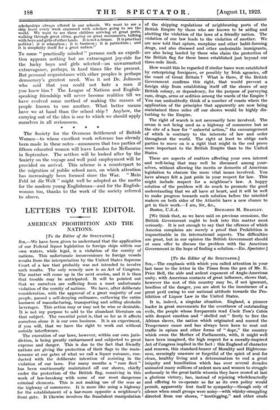LETTERS TO THE EDITOR.
AMERICAN PROHIBITION AND THE NATIONS.
[To the Editor of the SPECTATOR.] SIR,—We have been given to understand that the application of our Federal liquor legislation to foreign ships within our own waters, while legal, is a violation of the comity of nations. This unfortunate inconvenience to foreign vessels results from the interpretation by the United States Supreme Court of a law that probably was not intended to involve such results. The only remedy now is an Act of Congress. The matter will come up in the next session, and it is then that trouble may be anticipated. It will be pointed out that we ourselves are suffering from a most unfortunate violation of the comity of nations. We have, after deliberate consideration, with the approval of a great majority of our people, passed a self-denying ordinance, outlawing the entire business of manufacturing, transporting and selling alcoholic beverages. This action may or may not be wise or desirable. It is not my purpose to add to the abundant literature on that subject. The essential point is, that so far as it affects ourselves alone it is our own business. It is an experiment, if you will, that we have the right to work out without outside interference.
The execution of our laws, however, within our own juris-
diction, is being greatly embarrassed and subjected to great expense and danger. This is due to the fact that friendly nations are giving the protection of their flags to the main- tenance at our gates of what we call a liquor nuisance, con- ducted with the deliberate intention of assisting in the violation of our laws. For many months a " rum fleet " has been continuously maintained off our shores, chiefly under the protection of the British flag, conniving in this work of law-breaking with some of our most dangerous criminal elements. This is not making use of the seas as the highway of commerce. It is more like using a highway for the establishment of a bar-room opposite a neighbour's front gate. It likewise involves the fraudulent manipulation
of the shipping regulations of neighbouring ports of the British Empire by those who are known to be aiding and abetting the violation of the laws of a friendly nation. The violation of one law leads to the violation of another. We are now told that opium, morphine and other habit-forming drugs, and also diseased and other undesirable immigrants, are also being landed by those who claim the protection of the British flag for these bases established just beyond our three-mile limit.
How would this be regarded if similar bases were established by enterprising foreigners, or possibly by Irish agencies, off the coast of Great Britain ? What is there, if the British Government confirms this right, that would prevent a foreign ship from establishing itself off the shores of any British colony, or dependency, for the purpose of purveying rum, drugs, arms or sedition among the wards of the Empire ? You can undoubtedly think of a number of coasts where the application of the principles that apparently are now being maintained three miles off our shores would be highly dis- turbing to the Empire.
The right of search is not necessarily here involved. The ocean is not being used as a highway of commerce but as the site of a base for " unlawful action," the encouragement of which is contrary to the interests of law and order throughout the world. The right at least to oblige such parties to move on is a right that might in the end prove more important to the British Empire than to the United States.
These are aspects of matters affecting your own interest and well-being that may well be discussed among your- selves, without allowing the merits or demerits of American legislation to obscure the more vital issues involved. You have always felt a just pride in your respect for law. This might include respect for a neighbour's law. A happy solution of the problem will do much to promote the good understanding that we all have at heart, and it will be well to make progress towards such solution before the mischief makers on both sides of the Atlantic have a new chance to get in their work.—I am, Sir, &c., [We think that, as we have said on previous occasions, the British Government ought to look into this matter most seriously. It is not enough to say that the offences of which America complains are merely a proof that Prohibition is impracticable in its international aspects. The difficulties are great, but in our opinion the British Government should at once offer to discuss the problem with the American Government in the hope of finding a solution.—En. Spectator.]


































 Previous page
Previous page